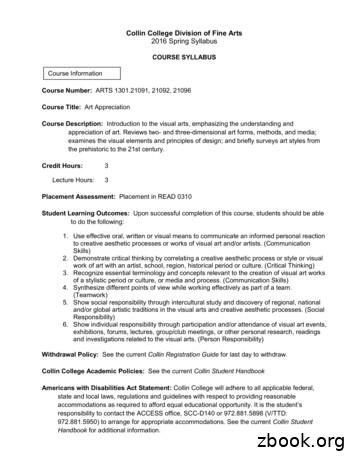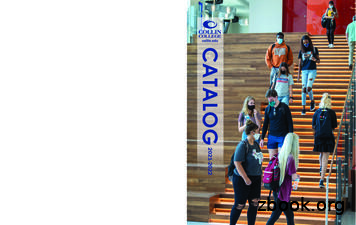Collin College Division Of Fine Arts 2016 Spring Syllabus
Collin College Division of Fine Arts2016 Spring SyllabusCOURSE SYLLABUSCourse InformationCourse Number: ARTS 1301.21091, 21092, 21096Course Title: Art AppreciationCourse Description: Introduction to the visual arts, emphasizing the understanding andappreciation of art. Reviews two- and three-dimensional art forms, methods, and media;examines the visual elements and principles of design; and briefly surveys art styles fromthe prehistoric to the 21st century.Credit Hours:Lecture Hours:33Placement Assessment: Placement in READ 0310Student Learning Outcomes: Upon successful completion of this course, students should be ableto do the following:1. Use effective oral, written or visual means to communicate an informed personal reactionto creative aesthetic processes or works of visual art and/or artists. (CommunicationSkills)2. Demonstrate critical thinking by correlating a creative aesthetic process or style or visualwork of art with an artist, school, region, historical period or culture. (Critical Thinking)3. Recognize essential terminology and concepts relevant to the creation of visual art worksof a stylistic period or culture, or media and process. (Communication Skills)4. Synthesize different points of view while working effectively as part of a team.(Teamwork)5. Show social responsibility through intercultural study and discovery of regional, nationaland/or global artistic traditions in the visual arts and creative aesthetic processes. (SocialResponsibility)6. Show individual responsibility through participation and/or attendance of visual art events,exhibitions, forums, lectures, group/club meetings, or other personal research, readingsand investigations related to the visual arts. (Person Responsibility)Withdrawal Policy: See the current Collin Registration Guide for last day to withdraw.Collin College Academic Policies: See the current Collin Student HandbookAmericans with Disabilities Act Statement: Collin College will adhere to all applicable federal,state and local laws, regulations and guidelines with respect to providing reasonableaccommodations as required to afford equal educational opportunity. It is the student’sresponsibility to contact the ACCESS office, SCC-D140 or 972.881.5898 (V/TTD:972.881.5950) to arrange for appropriate accommodations. See the current Collin StudentHandbook for additional information.
INSTRUCTOR INFORMATIONInstructor’s Name:Office Number:Office Hours:Phone Number:Email:Scott TrentL255By appointment214-202-7325 cellstrent@collin.edu (all official school correspondence), scott@inxlab.comClass Information:Section Number: P03, P04, P05Meeting Times:8:00 - 9:15 am, 10 – 11:15 am, 11:30 – 12:45 pm, Tue/Thrs.Meeting Location: PRC L248Minimum Technology Requirement:Basic computer skills, including the ability to use MS Word, PowerPoint, some type of graphicapplication, such as Adobe Photoshop, and create a pdf file.Minimum Student Skills:Ability to follow directions, articulate ideas, and work within groups. Since a service learning projectwill be involved with the class curriculum, a professional appearance and demeanor will be expectedwhen interacting with community partners.Netiquette Expectations:All electronic communication is expected to be professional, courteous and appropriate for classroomdiscussion. Sign all email correspondences and files submitted via email must have the student’sname in the title. If uncertain whether the instructor will have the appropriate application to view thefile, convert all submitted documents to a pdf format.Course Resources: NoneSupplies:Class workbook. The class assignments inyour workbook will be handed in for a grade at the end of the semester.Text book: Gateways to Art: Understanding the Visual Arts, DeWitte, Larmann, & ShieldsAttendance Policy:Attendance is expected. Attendance is essential for success in this class. A class presentation quizgrade requires students to be present and complete a questionnaire about student presentations.Students must be in attendance to submit quiz. This counts 15% to student’s final grade. In classassignments will not be able to be made up or provided in advance. If you miss a class, please find afellow student to provide the lesson for that day. Do not contact the instructor for the assignments forthat day. In class assignments are designed to be done in class and help evaluate the student’soverall participation in the course. If a student misses four classes they will not pass the course.Method of Evaluation:Grades are based on the scale of 100 points. Each assignment is worth 100 points which apply to thefinal grade based on the percentage listed below. No late work is accepted! Since most work ispresented as a class presentation, there are no opportunities to submit work late.
Workbook- In-class quizzes- Art reflections- Gallery visit- Artist interview- Banksy- Self-portrait- Visual element exercise- Collage- Art period exercises35%Class Presentations [ 5 ]- visual elements- art- artist- media- art period40%Final examTotal25%100%Grade scaleA (90-100)B (80- 89)C (70- 79)D (60- 69)F (Below 59)Class projects:Requirements for Participation in Collaborative Activities:All students will be expected to participate in class projects and coordinate with fellow students whengroup work is assigned.Criteria Used To Evaluate Participation In Such Activities:Evaluation will be based on a combination of group assessment, class participation, and ability tosatisfy exercises as assigned.Delivery Method of Feedback and/or Graded Material:All submitted material will be returned with comments and a grade, while weekly check-ins will serve toprovide feedback and monitor the group’s progress.Standards for Instructor Response and Availability:All assignments will be graded and returned to students within one week. Email responses can beexpected within 48 hours. Face to face meetings can be scheduled twice a week during office hoursor before/after class. Email is the quickest way to reach me, use strent@collin.edu orscott@inxlab.com
Course Calendar:Tue., Jan. 19Thr., Jan. 21Tue., Jan. 26Thr., Jan. 28Tue., Feb. 2Thr., Feb. 4Tue., Feb. 9Thr., Feb. 11Tue., Feb. 16Thr., Feb. 18Tue., Feb. 23Thr., Feb. 25Tue., Mar. 1Thr., Mar. 3Tue., Mar. 8Thr., Mar. 10Tue., Mar. 15Thr., Mar. 17Tue., Mar. 22Thr., Mar. 24Tue., Mar. 29Thr., Mar. 31Tue., Apr. 5Thr., Apr. 7Tue., Apr. 12Thr., Apr. 14Tue., Apr. 19Thr., Apr. 21Tue., Apr. 26Thr., Apr. 28Tue., May. 3Thr., May. 5Tue., May. 10Thr., May. 12IntroductionArt period lecture – Timeline of idealsArt lecture – self-portrait exerciseRenaissance (Select visual element/design principle)Visual element presentationBaroque - RococoVisual element presentationNeo-Classicism (Select media)Media presentationRealismMedia presentationRomanticism (Select artist)Artist presentationImpressionismNo Class – SpringBreakArtist presentationPost-Impressionism (Select art)Art presentationCubismArt presentationSurrealism - Dada (Select art period)Art Period presentationGallery Visit Exercise – No Class meetingArt Period presentationAbstract ExpressionismPop Art ExerciseMinimalismBanksy ExercisePost Modernism(Workbook Due) – Grade form exerciseStudent conferences10 - 11:15 classFinal Exam Week8 – 9:15 & 11:30 – 12:45 classes
Self-portrait ExerciseFind a classic work of art that represent you.Bring in image to insert in workbook. (By next class, Jan. 26th.) – be prepared to present to classDocument:- Title of work- Artist’s name- Year paintAnswer: Why or how does this painting represent/reflect/resemble you?Attach image below-
Collin College Division of Fine Arts 2016 Spring Syllabus COURSE SYLLABUS Course Information Course Number: ARTS 1301.21091, 21092, 21096 Course Title: Art Appreciation Course Description: Introduction to the visual arts, emphasizing the understanding and appreciation of art.
Collin College Internet Address: collin.edu Collin College is an equal opportunity institution and provides educational and employment opportunities without discrimination on the basis of race, color, religion, sex, age, national origin, disability, veteran status or other legally protected class. 12231-19PB 2019-2019 Collin College Catalog. 0 .
Burton College & Career Academy 2301 S. John King Blvd. Rockwall, Texas 75032 469.698.7499 Collin College Internet Address: collin.edu 2021-2022 Collin College Catalog Collin College is an equal opportunity institution and provides educational and employment opportunities without discrimination on any basis protected by applicable law. 14258 .
Collin College Handbook for Faculty & Adjunct faculty . 5 Courtyard Center (CYC) 4800 Preston Park Blvd. Plano, TX 75093 972.985.3790 Executive Dean Karen Musa 469.365.1961 kmusa@collin.edu Executive Director, Corporate College (Customized Training) Adam Pitluk 972-599-3188 apitluck@collin.edu Director, Center for Workforce
Android DDI: Dynamic Dalvik Instrumentation 30th Chaos Communication Congress Hamburg, Dec. 29th, 2013 Collin Mulliner collin[at]mulliner.org twitter: @collinrm. 2 Collin Mulliner - "Android DDI: Dynamic Dalvik Instrumentation" - 30C3 NEU SECLAB finger collin@mulliner.org
Collin College Vision 2016 Page 4. Strategic Planning Goal Teams . A Goal Team was developed for each goal with the purpose of further defining the expected results and the targeted actions that will be implemented as part of the new strategic plan at Collin College. Goa
A Fine, Fine School Independent Reading R e a d e rs eGuid RRR eee adddeeerrrr’’ss GG u ii d e A Fine, Fine School The Fine, Fine School Times Tillie is writing an article for the school newspaper, The Fine, Fine School Times. Her article will tell the real story. Use the text and illustrations to help her write the article. Read pages 20–23.
2016 NHDOT Division 600 Construction Manual Link to: Division 100 Division 200 Division 300 Division 400 Division 500 Division 600 Division 700 Division 800 Division 900 Master Table of Contents 600-6 The following table list design requirements for 3750-D RCP pipe. Design Requirements For Reinforced Concrete Pipe (3) .
6 Introduction to Linguistic Field Methods :, We have also attempted to address the lack of a comprehensive textbook that p.resents the rudiments of field methodology in all of the major areas of linguistic inquiry. Though a number of books and articles dealing with various aspects offield work already exist esee for example Payne 1951, Longacre 1964, Samarin 1967, Brewster 1982, and other .























